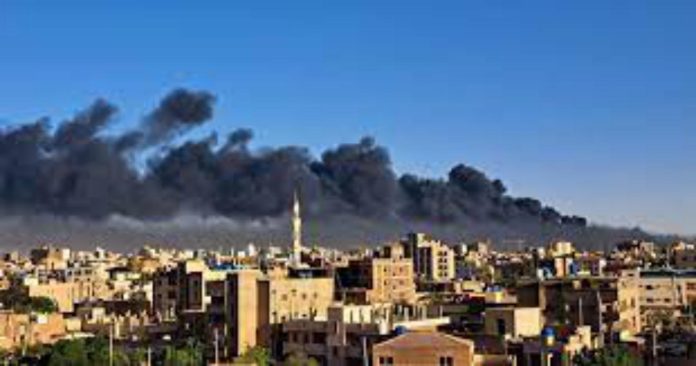Once again war is ripping apart the lives of millions. A capital city is under bombardment, dead bodies litter the streets while hospitals and markets burn. It has been left to ordinary people to organise medical supplies, find water and food and risk their lives under fire to keep basic infrastructure going.
Unlike in the war in Ukraine, the warring parties in Sudan are both from within the same country as the civilian population they are terrorising. One of them, the Rapid Support Force (RSF), is a brutal militia which grew out of the Janjaweed forces, the other the Sudanese Armed Forces. Their leaders have long been partners in crimes against the Sudanese people, from Darfur, to Port Sudan, to the streets of Khartoum. Now these thieves and murderers are fighting each other for a bigger share of the spoils of power.
Just as in Ukraine, the horrors of this war are not simply produced at a local level, however. They are the outcome of forces deep within the capitalist system. Sudan’s gold flows through the markets of the Gulf and her livestock and fertile soils feed millions beyond her borders. This land where a third of the population relies on humanitarian aid also produces unbelievable wealth for a tiny minority. That minority serves the interests of the ruling classes of richer and more powerful states as well as its own, from providing young men as cannon fodder for Saudi Arabia and UAE’s war on Yemen, to supporting the Egyptian dictatorship in the growing power struggle with Ethiopia over the waters of the Nile, to acting as a proxy border guard for the leaders of the European Union (who have helped fund the RSF) and Britain.
The competing states of the wider region and the great powers at the centre of the global system have the blood of the Sudanese people on their hands. They boosted the arsenals of these gangsters while lecturing Sudanese civilian parties and the country’s revolutionary movement about the need to sit down and negotiate power-sharing deals with their killers.
And now the states of the EU and Britain are intensifying their war on Sudanese refugees, denying them safe passage and ramping up toxic campaigns which fuel the rise of the far-right. This stark contrast with the welcoming hands opened to Ukrainian refugees further demonstrates the hypocrisy of imperialist countries on wars and migration.
The only real alternative to this carnage lies in the revolutionary movement which has achieved so much since the downfall of dictator Omar al-Bashir in 2019. And the international solidarity of the working class is crucial to support it.
Out of the ashes of decades of civil war, in the midst of hunger and poverty for many, ordinary people across Sudan have forged forms of self-organisation from below on a scale we have not seen for years. The Resistance Committees, independent trade unions, and campaigns raising demands for refugee rights and environmental justice have mobilised millions against dictatorship, collectively created charters proposing far-reaching democratic reforms and the redistribution of wealth and frequently stepped into the breaches left by the absent or hostile state to provide food, shelter, medical aid, electricity and water for ordinary people.
This is where the forces can be found to challenge not just the warring generals, but the wider Sudanese ruling class, its allies in the region and beyond and break the state which makes war on the people of Sudan.
Solidarity with the Sudanese revolution is an urgent task for socialists, workers and trade unionists around the world. The horror in Sudan is another example confirming that capitalism offers nothing to the workers and poor of the world. It means war, poverty, racism and environmental collapse.
Solidarity with Sudanese refugees, open the borders!
Stop the war machine, no arms or support for any of the generals and their allies!
Victory to the Sudanese Revolution!
The Coordination of the International Socialist Tendency
5 May 2023









